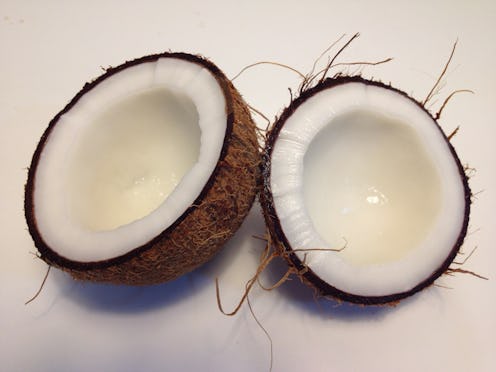Life
Coconut Oil Isn't As Healthy As You Thought
It seems coconut oil's recent popularity may have exceeded its actual ability: according to a new report by the The American Heart Association, coconut oil isn't as healthy as everyone thought, and its high levels of saturated fats may allegedly do more harm than good. You can find jars of the sweet-smelling tropical fat lining the aisles of health food stores, but the much-hyped benefits of coconut oil have been a mix of myth and reality. Claims have spread across the interwebs that the magic substance could do anything from fixing dry hair and skin (true) to slowing the aging process and protecting against Alzheimer's (not so true). While the nutty and delicate oil is a tasty addition to pastries and veggie sautés, the AHA does not recommend that it be a staple of any diet.
Of the fat found in coconut oil, 82 percent of it is saturated. This is higher than butter (63 percent), beef fat (50 percent) and, surprisingly, pork lard (39 percent). And, while we are taught that plant-based fats are better for us than animal fats, the AHA does not recommend this as a blanket policy.
Consuming high amounts of saturated fat can raise LDL cholesterol (the "bad" kind), which can have serious ramifications, and coconut oil is not immune. "Because coconut oil increases LDL cholesterol, a cause of CVD [cardiovascular disease], and has no known offsetting favorable effects, we advise against the use of coconut oil," states the American Heart Association in its advisory.
Some believe that the combinations of saturated fats found in virgin coconut oil behave differently from other saturated fats, making it better for you. Despite the antioxidants and essential fatty acids present in the virgin oil, a review of previous studies by the ADA found that coconut oil was shown to increase bad cholesterol in all examined controlled trials. The AHA advises swapping out the sweet oil for an unsaturated vegetable oil such as soy, sunflower, or olive oil. Fat is an important part of a healthy diet; however, the AHA recommends lowering saturated fat to no more than 5 to 6 percent of your daily caloric intake. "We want to set the record straight on why well-conducted scientific research overwhelmingly supports limiting saturated fat in the diet to prevent diseases of the heart and blood vessels," adds Dr Frank Sacks, lead author of the AHA report.
Sadly, it seems coconut oil's hype may be on the decline, but don't despair, coconut water is still going strong in the healthfood industry. More research is needed to back up certain claims about the natural refresher, but at least for now, it's safe.
